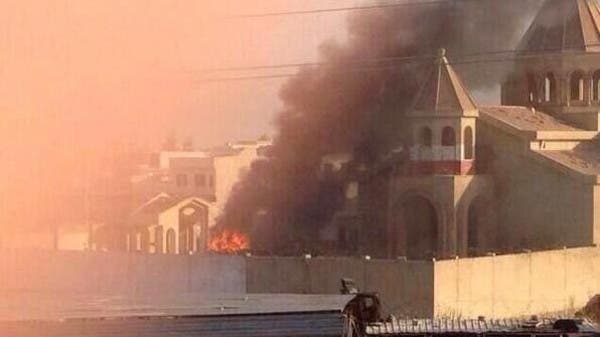
Barring some awful, “Guns of August” style massive conflict that may be waiting around the corner (an uncomfortable thought in July of the centennial year of 1914, when so many tinderboxes are scattered around the world), the conventional wisdom of military near-futurists is that wars will be messy but essentially small-scale, asymmetrical, low-intensity affairs, where smarts, technology, and agile use of politics and media will give one side or the other an edge.
The temptation of such scenarios is thinking that these sorts of conflicts can be managed and their human cost can be minimalized, marginalized, rationalized and generally explained away. In the last few days, however, we’ve seen dead Palestinian children on a beach or a shattered civilian airliner, its human cargo suddenly and horrifically extinguished, reminding us that the human costs of even limited war will always be more unpredictable than the war-managers would like.
Today on the Foreign Policy website, David Rothkopf muses on these sudden and brutal costs occur at the “ragged edges” of contemporary war, and suggests that human cost, always unpredictable and surprisingly horrific, indicts the “hubris” of leaders who think that they can control the uncontrollable. The medievals, with their idea of the Wheel of Fortune as a symbol for the uncertainty of the world and a warning for the ruler who might trust his fortunes to war, seem closer to us, and wiser, than we might think.
In the first half of the twentieth century, wars were formally declared and were governed by treaties and rights regimes such as the Geneva Convention, which went some way towards mitigating, or at least contextualizing, the grievous costs of total war. Bombing cities and killing civilians was horrible, but it could be justified, however dubiously: it was reciprocal (they bombed us first), it was necessary (those civilians also work in war plants and support their government), it was existential (we need to do whatever it takes to win, or our civilization will be lost), or even humane (the harder we bomb, the sooner they’ll give up and in the end we’ll save lives). It was possible to bomb enemy cities and still expect that certain standards of humanity would prevail, so that, for example, captured aircrew would be treated properly as POWs by the same people they had bombed. As Rothkopf notes, in total war, the term “collateral damage” doesn’t make much sense, since one does what one has to do to prevail. In total war, all damage is proximate. There is no collateral.
Post Iraq and Afghanistan, the temptation for the West is to get out of these messy and indeterminate wars, to retreat to within the relative safety of ourborders, and to manage the risks of entering or avoiding small wars and conflicts as cleverly and carefully as we can. However, in our globalized world, civilian airliners, like the ocean liners of the early 20th century, will continue to link cities. Last week I flew across the Atlantic to Rome, and other than the usual vague annoyances at airport security (which make us acknowledge, however lightly, the possibility of terrorism), I never imagined that there was any greater risk. For the last decade we’ve thought about shoe bombs and underwear bombs and box cutters. I am sure that the people on MH17, even if they looked at the maps on their TV screens and realized they were flying over the Ukraine, never thought for a moment that they could be swatted down by a conventional missile developed and built in the late Cold War. Likewise, I am sure that most people on the RMS Lusitania never imagined that war would touch them until a German torpedo struck them. While there were debates about whether Germany and Britain violated an international agreement known as the Cruiser Rules (the Germans by firing on a civilian ship without warning, the British for putting munitions on a civilian ship), it triggered a crisis that eventually brought the United States into the Great War. That consequence was probably not foreseen by the German war planners when they first decided to use their submarines to declare a zone of war around the British Isles. Collateral damage then, as now, can have unpredictable consequences.
It will be interesting in the days ahead to see what can be learned about the downing of MH17, and about the responsibility for that act and where, if anywhere, it leads the world community that still wants to believe in the ideal of safe civilian air traffic, if not in any greater responsibility for the prosecution of war crimes. As for Israel’s Gaza incursion, I heard an Israeil diplomat to the US make this statement of belief in the possibility of the carefully managed war on the PBS NewsHour this Wednesday.
"And I think we should wait, hopefully, when this operation will come to an end, and we will get a good understanding of what happened.It’s important to realize Hamas uses the Palestinian population as human shields. They put missile batteries next to schools, mosques, hospitals. They are doing everything they can to put the Palestinian population in Gaza into harm’s way.Israel is doing everything it can, whether it’s dropping flyers, calling people, sending text messages, taking all sorts of actions to get the Palestinian civilians out of harm’s way."
I don’t personally know what to think about Israel vs Gaza. I can see the validity of arguments based on Israel’s right to exist and its need to be recognized as a state as a precondition to peace. I can see why Palestinians can see themselves as an oppressed and occupied people, living in what is essentially a walled ghetto. But I fear, listening to the Israeli envoy on Wednesday, that there is the comfort of a script unfolding, a script that says war can be managed politically and technologically with minimum collateral damage, and I fear that this comfort is illusory and that, one day, this script will go horribly wrong.







